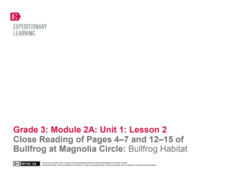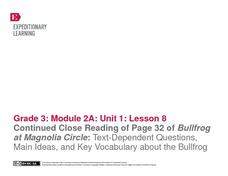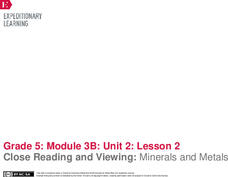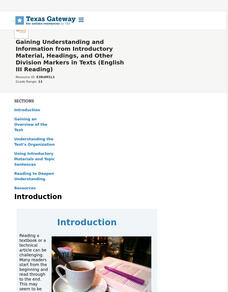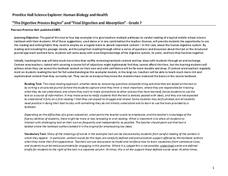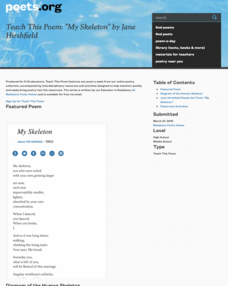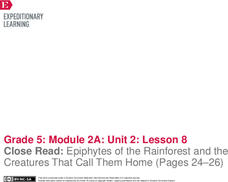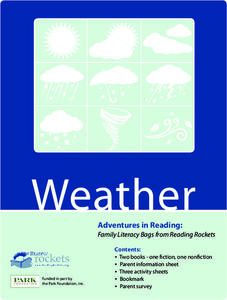EngageNY
Close Reading of Pages 4 - 7 and 12 - 15 of Bullfrog at Magnolia Circle: Bullfrog Circle
Scholars take part in a close reading of pages four through seven and 12-15 of the book, Bullfrog at Magnolia Circle: Bullfrog Circle by Deborah Dennard. Readers identify the story's main idea, list its key details, and examine...
Curated OER
Unit 1: Water is Life: The Heart and Science Behind this Phrase
Water, water, everywhere — but will there be enough to drink? Check out these detailed lesson plans to meet NGSS water cycle and CCSS literacy standards in your science classroom. Learners do a close reading of a challenging, poetic text...
EngageNY
Close Reading of Bullfrog at Magnolia Circle: Text-Dependent Questions, Main Ideas, and Key Vocabulary about the Bullfrog
As your 3rd grade class finishes reading Bullfrog at Magnolia Circle, the eighth lesson plan of this unit helps readers from an understanding of the very specific information on the final page of the book. As with the entire unit,...
EngageNY
Close Reading and Viewing: Minerals and Metals
How easy is it to live off the land? Scholars read Minerals and Metals in Your Life and discuss how Canada's natural resources meet the needs of the people. Pupils watch a brief video and discuss the gist of the text and video. They...
Core Knowledge Foundation
Unit 9: The Science of Breakable Things by Tae Keller
A novel study examines The Science of Breakable Things by Tae Keller. Fifth graders participate in daily readings, discussions, and assignments following an "ask, explore, imagine, observe, and understand" routine. A final performance...
Core Knowledge Foundation
Insects Tell It Again!™ Read-Aloud Anthology
A read-aloud anthology explores the world of bees, wasps, beetles, termites, ants, fireflies, and more. Scholars listen to stories and discuss topics and practice word work. Extension opportunities keep the learning going in and out of...
Curated OER
Advanced Critical Reading: Biomimetics
Instruct your class on biomimetics while practicing reading comprehension with this learning exercise. Learners read a passage that describes the efforts of scientists, starting with Leonardo da Vinci, to emulate nature to solve issues...
Texas Education Agency (TEA)
Gaining Understanding and Information from Introductory Material, Headings, and Other Division Markers in Texts (English III Reading)
All teachers are teachers of reading! The 13-part interactive series ends with a lesson that teaches learners (and their instructors) how to approach reading their textbooks. After learning about several strategies, users test their...
Newspaper Association of America
Cereal Bowl Science and Other Investigations with the Newspaper
What do cereal, fog, and space shuttles have to do with newspapers? A collection of science investigations encourage critical thinking using connections to the various parts of the newspaper. Activities range from building origami seed...
Curated OER
Unwind: Directed Reading Thinking Activity
To generate interest in reading Neal Shusterman's young adult science fiction novel Unwind, class members engage in a Directed Reading-Thinking Activity (DRTA) that asks them to examine the front and back covers, the blurbs, and "The...
Academy of American Poets
Teach This Poem: "In the Next Galaxy" by Ruth Stone
Imagine what life might be like in a different galaxy. That's the challenge young scientists take on in a warm-up activity designed to prepare them for a close reading of Ruth Stone's poem "In the Next Galaxy." After class members share...
Curated OER
Science Puzzlers, Twisters, and Teasers: Chemical Bonding
What a cute approach to chemical bonding! Atoms all have human names and are attending at a dance. Who will pair up with whom? By reading the characteristics, and not the element name, chemistry whizzes figure out the bonding pairs....
National Park Service
Hibernation-Migration-Fascination
What's the difference between hibernation and a good nap? Find out with an engaging life science activity that compares the hibernation habits of grizzly bears and marmots. After learners read an informational passage about each mammal,...
Sunburst Visual Media
Clouds
Support science instruction with a combination of engaging activities and skills-based worksheets that focus on clouds. Learners take part in grand discussions, write an acrostic poem, complete graphic organizers, solve word...
Savvas Learning
"The Digestive Process Begins" and "Final Digestion and Absorption"
Want your class to digest text more thoroughly? Middle schoolers learn about the digestive system in the lesson and reinforce informational text reading skills through a variety of strategies. They engage in a close reading...
College Board
The Departure
Scholars learn about the Hero's Journey as they read Ray Bradbury's "The Drummer Boy of Shiloh." They analyze the story's structure and narrative techniques. Finally, they write summaries of the text's central idea and use their...
Columbus City Schools
ABC: Acid Base Chemistry
Bubble, bubble, boil and trouble! What causes common substances like baking soda and vinegar to react the way they do? Welcome your junior chemists to the wonders of acid-base chemistry using a comprehensive and fun...
Academy of American Poets
Teach This Poem: "My Skeleton" by Jane Hirshfield
Jane Hirshfield's poem "My Skeleton" asks readers to pause and think about the amazing, often taken-for-granted structure that protects and gives form to human bodies. After observing the human skeleton's image, class members read the...
EngageNY
Close Read: Epiphytes of the Rainforest and the Creatures That Call Them Home (Pages 24–26)
It's all connected. Scholars use pages 24-26 of The Most Beautiful Roof in the World to identify the relationship between the plants and animals in the rainforest. They answer and discuss questions about the relationship with a...
Curated OER
Phineas Gage: “This I Believe” Venn Diagrams After Reading Strategy
Difficulties with brain injuries still continue today. After reading Phineas Gage: A Gruesome but True Story About Brain Science, class members read a series of modern personal essays about brain injuries and choose an essay to compare...
PBS
Reading Adventure Pack: Weather
A reading adventure pack, featuring a fiction and nonfiction book focuses on the weather. Scholars read Cloudy with a Chance of Meatballs by Judi Barrett and Seymour Simon and then complete three creative activities. Participants craft...
K12 Reader
Habitat Destruction
What happens when an animal becomes endangered or extinct? Explore the ways that human influence throughout the environment has threatened the existence of other species with a reading passage. After reading the paragraphs, kids answer...
K12 Reader
Where On Earth Are You?
What do we use to determine the exact locations on the earth? Your kids can learn all about compass roses and latitude and longitude. Test understanding with the five reading comprehension questions included on the page.
K12 Reader
Rainforest Ecosystems
Rainforests are the topic of this brief reading passage. Learners can find out all about the different layers of the rainforest as well as the types of creatures that live there. After reading, they respond to five questions about the text.


